The Ultimate Guide to Turkish Holidays: 9 Public Holidays and tips on celebrating
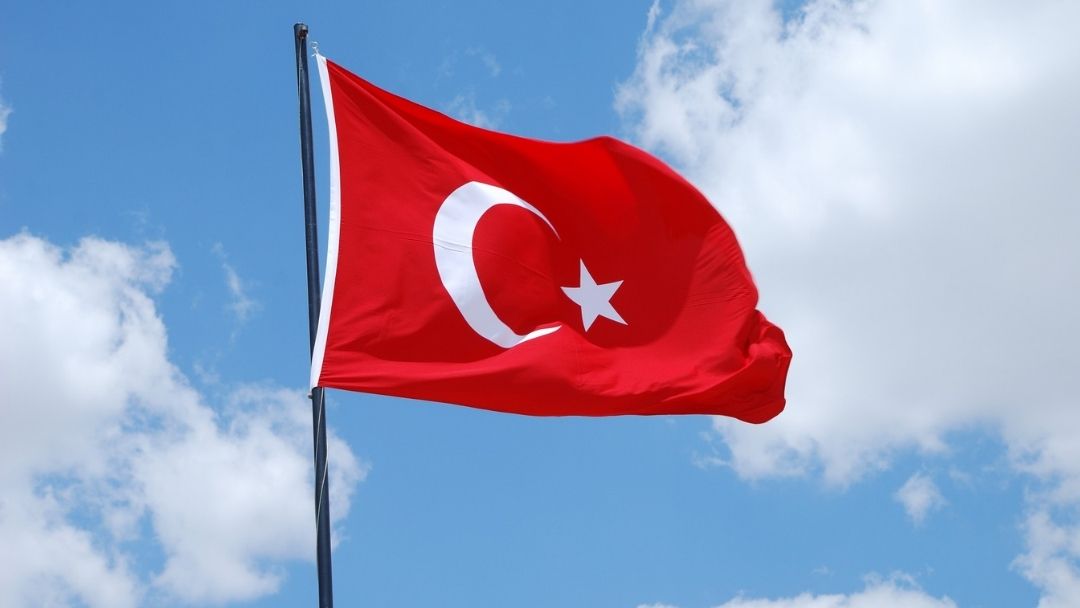
The Art of Living in Turkey contains affiliate links and is a member of the Amazon Services LLC Associates Program. If you make a purchase using one of these Amazon links, I may receive compensation at no extra cost to you. See my Disclaimers for more information.
When I first moved to Turkey back in 2019, I was struck by how different Turkish holidays are compared to those in the U.S.
There’s no Christmas cheer or trick-or-treating. Instead, Turkey has its own unique national and religious holidays that felt completely unfamiliar to me as a Westerner.
It was an adjustment, especially realizing that my favorite holiday, Thanksgiving, wasn’t even on the radar. That first year, I learned that navigating life in a country with different traditions requires curiosity, open-mindedness, and a lot of respect for the new culture I was living in.
Now, more than 5 years later, I have learned a lot about how to make my favorite holidays special as well as how to embrace Turkey’s special days.
In this post, I’ll guide you through the major holidays celebrated in Turkey, sharing insights to help you avoid common cultural missteps if you’re visiting or living here.
Holidays in Turkey are a fascinating mix of cultural, religious, and international observances. Some are rooted in Islam, others are uniquely Turkish, and nearly all mean that banks, schools, and most public offices will close for the day—so planning ahead is essential.
Before we dive in, there are two cultural nuances to keep in mind:
- In Turkey, dates are written day first, then month. For example, 9/7/22 means July 9, 2022—not September 7.
- Religion and politics can be sensitive topics. As a foreigner, it’s best to tread lightly, showing respect and being mindful of how you engage in discussions with locals.
With these tips in mind, let’s explore the religious and national holidays that shape life in Turkey.
New Year’s Day
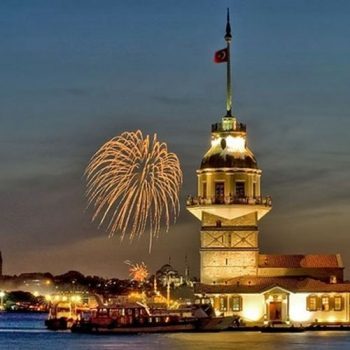
31 December – 1 January
Yılbaşı is the Turkish name for this holiday. Chances are you are familiar with this one!
While some countries have their own New Year, Turkey celebrates it the same days as many other countries: December 31 – January 1 every year.
Though they adopted the Western calendar in 1926, they didn’t actually accept this holiday as a national holiday until 1935.
Note: Devout Muslims don’t celebrate this holiday. It is more of a secular holiday in Turkey.
Since Turkey doesn’t celebrate Christmas, this is the big holiday of the season for them. It is celebrated on the night of December 31 and into January 1, much like in Western countries.
There are often gift exchanges and there is a massive lottery drawing on New Year’s Eve just before midnight.
In recent years, Santa Claus has begun to make a showing in malls and city decorations as they celebrate New Year’s. And you will always see fireworks for this holiday.
Children’s Day & National Sovereignty Day
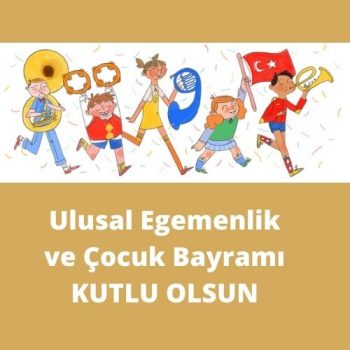
23 April
This holiday is known as Ulusal Egemenlik ve Cocuk Bayrami in Turkey and has been celebrated since 1920.
It is an important day in history because in 1920 on April 23rd, the first National Assembly was held.
According to history, Mustafa Kemal Atatürk, the beloved founder of Turkey, dedicated the new republic to the children of Turkey.
Turkey was also the first country to create a holiday dedicated to children.
Sixty years later this holiday became an International Children’s Day by UNICEF. It is celebrated on June 1 around the world.
While the world celebrates in June, Turkey still celebrates these two days together as they are a part of the same monumental event in history.
This day is celebrated by memorials, displaying wreaths, and giving speeches throughout the country. You will also often see a van or such with a loudspeaker driving through the neighborhood declaring the day.
A special feature of this holiday is that two children are selected to act as President and Prime Minister for the day. They are on TV and carry out official duties.
In addition, in recent years, children have been invited from other countries to celebrate this holiday by staying with local families for a week.
Labor Day

1 May
The Turkish name is Emek ve dayanışma günü. Most of the world celebrates Labor Day on May 1 while Americans celebrate it on the first Monday in September every year.
This holiday is all about celebrating workers’ contributions to society and the economy.
There is often a spotlight on the progress that still needs to be made in regard to better working conditions.
Workers and trade unions are often seen doing protests on this day which are typically acceptable unless they enter an off-limit area.
I don’t know about you but we always celebrated with a barbecue often on the beach somewhere as I grew up in Florida.
Mangal (little grills Turks take everywhere) can be observed around parks everywhere on this holiday as they celebrate with delicious food.
This holiday has a bumpy history. After it was accepted as a public holiday in 1923, in 1925 it was banned. Then it was accepted again in 1935 but yet again was banned in 1981.
In 2009 it returned and is now celebrated as Labor and Solidarity Day.
Ramadan*
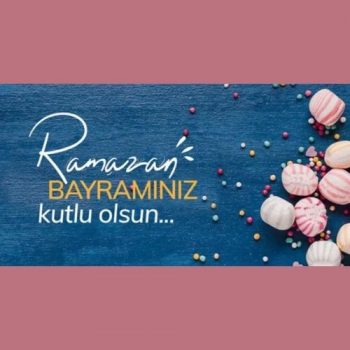
1 March – 29 March (2025)
In Turkish, Ramadan is called Ramazan Bayramı.
One thing I want to make sure I clarify with this holiday specifically is these dates are for the month of fasting.
Fasting is defined as the abstinence of eating, drinking, smoking, having sex, and any form of immoral behavior.
So if you’re looking to come to Turkey during the month of Ramazan Bayrami, you should be aware that many restaurants could be closed, especially if you are outside of tourist areas.
While you can find some places to eat during the day, if you’re in the neighborhood, it can often be seen as rude to do so. I would follow what the locals are doing.
It is also important to note that you may hear a drummer walking the streets a couple of hours before sunrise. This is a wake-up call so people can get up, make food, eat, and then go back to sleep before they start a day of fasting.
In 2025, 30 March – 1 April will be the celebration at the end of the month. There is a half day taken on March 29 and then the following two days are full National holidays.
This holiday following the month of fasting is often called Şeker Bayrami or Sugar Festival because they eat so many sweets after fasting for so long.
This celebration consists of days of feasting, visiting family and friends, giving small gifts to children, and drinking tea in the streets.
* This means that the holiday is an Islamic holiday and the dates change every year. Make sure to check the dates for the year you are going. Check on holidays here.
Youth and Sports Day
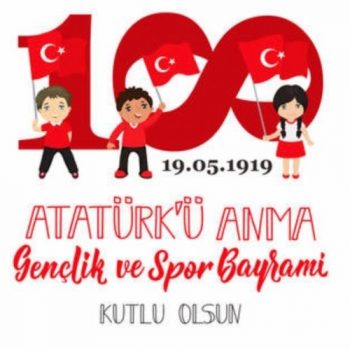
19 May
This holiday takes place on the same day every year. It is a combination of remembering Turkey’s founder and the love of youth and sports.
In Turkish it is called Atatürk’ü anma gençlik ve spor bayramı.
Many patriotic ceremonies, sports events, and celebrations take place throughout the country on this day.
On May 9 there is an annual marathon that starts in Samsun, where Ataturk’s independence movement began, and ends 10 days later in Ankara, the capital city, where they give the Turkish flag to the president.
Because Ataturk’s real birthday is unknown, many even celebrate this day as his birthday.
You will see many graphics with Ataturk’s photo on May 19. Those celebrating his birthday will even leave wreaths on monuments of Ataturk and they display Turkish flags everywhere.
Feast of Sacrifice*
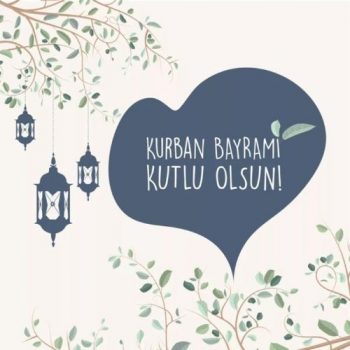
6-9 June
This holiday is known as Kurban Bayramı in Turkish. It also starts with a half day on the day before.
This is a religious holiday in Turkey that starts the night before and changes every year since it is based on the lunar cycle.
This important religious holiday has to do with when Ibrahim (Abraham) was commanded to sacrifice his son.
A difference to note here is that the Koran says he sacrificed Ishmael whereas the Bible says he sacrificed Isaac. This holiday is about celebrating Ibrahim’s willingness to obey God in any test, even this extreme one.
Depending on where you are in the country, you may see a sheep, goat, cow, or even a camel sacrificed for the feast. Some of the meat will be set aside for the poor as well as their old clothes.
In my experience in Turkey, this holiday is when most everyone closes up shop and takes an actual holiday. It often signals the end of the school year or is close enough to it.
You will likely find the city much like a ghost town during this holiday.
Democracy and National Solidarity Day
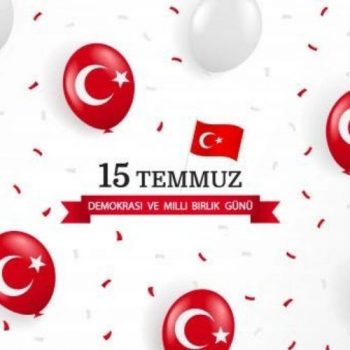
15 July
This is the newest public holiday in Turkey. It was established in 2016 after the failed coup attempt that year.
It is called Demokrasi bayramı in Turkish.
After the coup attempt in 2016, there were strong efforts to root out suspected rebel sympathizers in public offices.
President Erdogan established this holiday not long after the coup attempt took place and is celebrated with special memorial services for the armed forces, police, and others who were killed in helping stop the coup attempt.
It is a highly controversial holiday as there were sympathizers on both sides. As a foreigner, it is best to be careful and aware of your words and actions on a day like today.
Victory Day

30 August
This happens the same day every year and celebrates the Armed Forces.
The Turkish for this holiday is Zafer bayramı.
It is celebrated because while the first National Assembly took place in April, they were still fighting for their freedom.
There was an important battle fought at Dumlupinar against Greece in western Turkey for 5 days, August 26-30. The war officially ended on October 29th.
The creation of the Turkish republic was finally established and the modern secular country we know today was established.
For centuries prior Turkey was governed by the Ottoman Empire. While the Ottoman Empire lost all but the Turkish homeland after joining with the Axis powers in WW1, it eventually also lost the Turkish homeland as well.
Since its first official celebration in 1923, Victory Day has become a symbol of national pride, with citizens reflecting on Turkey’s history and the resilience of its people. (Visit Istanbul Official).
It wasn’t until 1935, however, that it was officially declared a national holiday.
It is celebrated by military parades, massive Turkish flags hung everywhere and anywhere, and gatherings around Ataturk monuments.
You can see air shows and jets leaving color trails that mirror the flag.
All banks, public offices, and schools are closed and many others can be expected to be closed on this holiday.
Republic Day

29 October
In Turkish we call this day Cumhuriyet bayramı.
This is probably one of the most important national holidays for many Turks, celebrating the establishment of the Turkish Republic in 1923.
As you have read, there are many holidays associated with Ataturk or the secular republic he established.
This is the day that it actually started all those years ago.
Earlier in the year the Sultanate, from the Ottoman Empire, was voted out and Turkey’s new parliament voted in.
While the country’s name was also changed to the Republic of Turkey prior to this date, on October 29, 1923, it was officially declared Republic Day by Ataturk himself.
He was then elected the first president.
It is interesting to note that his name, Ataturk, was not his given name but was later given to him by the Turkish parliament in 1934 as the name means “Father of the Turks” and was later denied for anyone else to carry the name.
If you’re in the country during Republic Day you won’t be lacking in things to do or see. Poetry readings, theatrical performances, folk dancing, and speeches abound.
You can visit Ataturk’s mausoleum in Ankara to pay honor by laying a wreath in his memory. It is a beautiful place but beware there will be queues.
There is also a special Republic Monument in Taksim Square on the European side of Istanbul. It commemorates the founding of the Turkish Republic in 1923.
If you get a chance to check it out, it is worth seeing even if you don’t go on this holiday.
There also will be parades with lots of music, flags, and dancing followed by fireworks. This special day commemorates the massive shift from an empire to a secular republic.
It is considered by many Turkey’s most important holiday.
Ataturk Memorial Day

10 November
While this is not a national holiday in Turkey, it is an important date to note and be aware of as it can be startling if you don’t understand what is going on.
Every year on this day at precisely 9:05 am sirens will sound.
Everyone takes a moment of silence to remember Atatürk. This is more common in Istanbul than out in rural Turkey.
He died of cirrhosis at this time on this day in 1938 at 57 years old.
If you are out in public stop what you are doing and follow along with everyone else. In some places, this means everyone stands still and at attention.
Sometimes drivers even get out of their cars and stop. So if you’re in a taxi and he stops with everyone else, don’t be alarmed. Take your cues from the Turks around you.
Businesses are open as usual as this isn’t a national holiday, just a moment of remembrance.
FAQs about Holidays in Turkey
Does Turkey celebrate Thanksgiving?
The short answer is “not officially”, though it has begun to become more popular in pockets of Turkey where there are many Americans. Read more about Thanksgiving in Turkey here.
Does Turkey celebrate Halloween?
Halloween isn’t widely celebrated in Turkey. Those who do observe it tend to gather at bars dressed in costumes, enjoying their favorite foods and drinks.
Final Thoughts on Turkish National Holidays
I hope after that you have a better understanding of Turkey’s cultural holidays and how they impact life here in Turkey.
While there is no Christmas or Halloween, formally anyway, they have a plethora of holidays that celebrate similar ideals.
Some of them can have an impact on your travels, like Ramadan and Kurban Bayrami, while others may not impact you at all, like everything else.
If you plan to visit during a religious holiday take a look at how to dress while you’re here. It might be better to be more conservative than not during a religious holiday.
Have you celebrated any Turkish holidays?
* This means that the holiday is a religious holiday and the dates change every year. Make sure to check the dates for the year you are going. Check on holidays here.
read more:
- Epic Water Filters are my favorite for travel with
- Winters in Turkey vary drastically based on where you are…learn more
- Looking for a good view? Check out these rooftop restaurants
- Teaching English abroad can allow you to experience a new culture
Turkey Vacation Basics
When I plan a trip these are the websites I use. I hope they help you plan your next adventure as well!
FLIGHTS: I am a huge fan of Skyscanner and WayAway.
VISAS: You can use the free e-visa portal here but for a few extra dollars you can use iVisa and someone else will handle any issues that may come up.
E-SIM: When I traveled to SE Asia I discovered e-sims and I’m never going back. Airalo has been easy and cheap!
TRAVEL INSURANCE: I use TravelInsurance.com for my trips abroad.
CAR RENTAL: I have loved working with Discover Cars when I rent cars in country.
AIRPORT TRANSFERS: I have used these transfers many times and they are always great. If you’d like more options, I also recommend GetTransfers.com as they allow you to compare companies.
ACCOMMODATION: Find the best Turkey hotel deals on Booking.com.
CITY TOURS & DAY TRIPS: You can browse GetYourGuide’s website to find just the tour you’re looking for! We also recommend the MegaPass for major cities.
